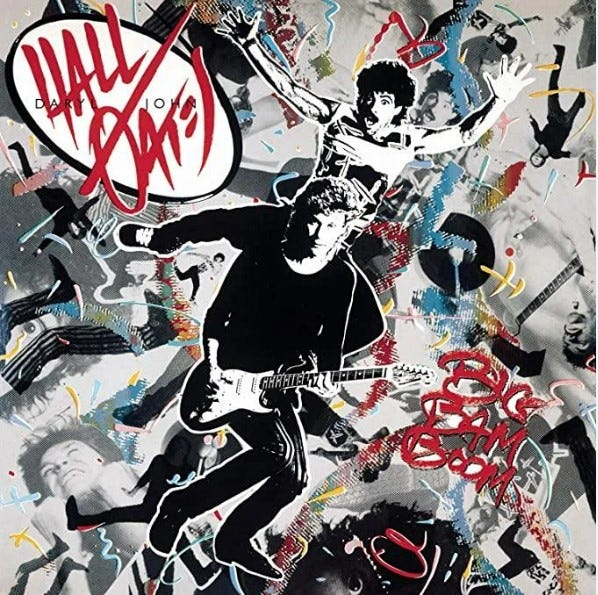Daryl Hall and John Oates: Big Bam Boom, 1984
The final album of Daryl Hall and John Oates’ Imperial Phase seemed to put production ahead of songwriting - but it's still fun
Coming off of the huge success of their 1981 album Private Eyes, Daryl Hall and John Oates were entering their Imperial Phase. Eyes went platinum and hit #5 on Billboard’s album chart, making it their first top 10 album, and also featured a pair of #1 singles in the title track and “I Can’t Go for That (No Can Do)” (the latter also topping the Dance and R&B singles charts). They released its follow-up, H2O, in October 1982, and climbed to even greater heights: lead single “Maneater” spent four weeks atop the Hot 100 in late December ‘82 and early January ‘83 (their longest-running #1 out of six across their career), two more singles made the top 10 (soulful ballad “One on One” and the Mike Oldfield-penned rocker “Family Man”), and the album got to #3, their highest-peaking album on the Billboard charts.
[For chart nerds: H2O spent 15 consecutive weeks stuck at that position, from January 15th to April 23rd, behind a collective quartet of albums: Men at Work’s Business As Usual and Michael Jackson’s Thriller, which peaked at #1, and Stray Cats’ Built for Speed and Journey’s Frontiers, which couldn’t get higher than #2. The Jackson and Journey albums each leapfrogged Hall & Oates while they sat, patiently, at #3.]
October clearly worked for H&O as a release date, so in October ‘83 they dropped Rock ‘n Soul Part 1, a greatest hits album with a pair of new songs. The album peaked at #7 and spun both of its new songs into the top 10 of the Hot 100, with “Say It Isn’t So” spending an agonizing four weeks at #2 behind Jackson and Paul McCartney’s “Say Say Say,” and “Adult Education” getting to #8. And in, you guessed it, October ‘84 came Hall & Oates’ next studio record, the aptly-titled Big Bam Boom.
Boom would be their fourth and final top 10 album, peaking at #5. It was led off with their final #1, “Out of Touch,” and was their last to produce two top 10s, let alone four top 30s, both of which it did. Interestingly, both “Touch” and follow-up “Method of Modern Love” cracked the R&B top 30 as well, the only time H&O had two singles from one album do so.
As for the album’s sound, it was both consistent with what had come (recently) before and a step forward. During the sessions for the album, Hall & Oates (and producer Bob Clearmountain) started playing around with Synclaviers and Fairlights (sampling synthesizers). John Oates said of the recording process, in his 2017 memoir Change of Seasons, “We embraced each new device on its merits as a tool to enhance and integrate into the recording process. For us, they were instruments to be used to achieve an end: service and enrich the songs.” Unfortunately, much of the time Big Bam Boom sounds more concerned with “Look at the sounds we can make!” than “How about these great songs?”
The great Arthur Baker is credited as "Mix Consultant and Additional Production" on the album, and sure, it largely sounds great. (You can especially hear his influence on the opening one-two of “Dance on Your Knees” and “Out of Touch.”) But the songs don’t all hold up to the thick layers of sound and effects piled on top of ‘em. Take as an example “All American Girl.” First of all, after Tom Petty’s “American Girl,” it should be illegal for anyone else to attempt a similar song. Secondly, the opening couplet is “Skin tight/Soul delight” — what the fuck? The melody is thin. There’s a John Oates mini-rap. (No. Just, no.) There’s nothing here. The album’s final single, the Oates-sung “Possession Obsession,” suffers from many of the same problems (though mercifully there’s no rap).
This isn’t to say the album is a failure, or that there are no highlights, as neither is true. The charming second single “Method of Modern Love,” which has a video so perfectly cheesy you can’t help but smile at it, has a few too many musical effects, but is a gorgeous Hall/Jana Allan composition about, well, modern love that succeeds precisely because its lyrics are so cutely and acutely penned. Third single “Some Things Are Better Left Unsaid,” a solo Hall writing credit, uses its sounds/effects to its benefit, smartly using them to punctuate his lyrics. And “Out of Touch” just slams, period.
After Big Bam Boom, Hall & Oates embarked on a lengthy tour, recorded/released an EP with their idols David Ruffin and Eddie Kendricks of the Temptations (Live at the Apollo), and then went into hibernation. Hall released a Dave Stewart-produced solo album in 1986, Three Hearts in the Happy Ending Machine, but wouldn’t rejoin forces with Oates until 1988’s shall-we-say-unfortunate Ooh Yeah! Their Imperial Phase was definitely, definitively over. And while this perhaps wasn’t quite the note on which they wanted to go out, hit though it was, at least its title was truth in advertising.
[Originally written for Rock and Roll Globe in 2019.]




